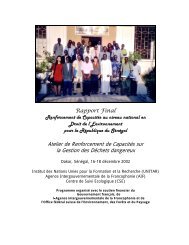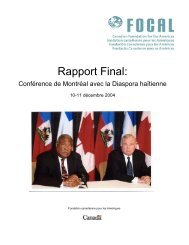Text of Shirin Ebadi's speech - UNITAR
Text of Shirin Ebadi's speech - UNITAR
Text of Shirin Ebadi's speech - UNITAR
You also want an ePaper? Increase the reach of your titles
YUMPU automatically turns print PDFs into web optimized ePapers that Google loves.
followers <strong>of</strong> other religions are similarly entitled, for example, to draft a Jewish<br />
Human Rights Declaration, a Buddhist Human Rights Declaration, and thousands<br />
more. This is not the right way to go. The world cannot be run on the basis <strong>of</strong><br />
its myriad religions. We have to take the principles that all agree on as our<br />
premise, not the principles in which only we believe.<br />
The surprising point is that it is not only non-democratic Islamic States which<br />
resort to such arguments. Governments which do not believe in God and whose<br />
intellectual basis lies in Communism are <strong>of</strong>ten not prepared to accept and apply<br />
the principles <strong>of</strong> human rights. These States assert that human rights are built<br />
on a set <strong>of</strong> values established under a capitalist regime and are not<br />
commensurate with socialist values. They therefore allow themselves to trample<br />
on people’s rights and forcefully to stifle any voice <strong>of</strong> dissidence. Obviously, their<br />
claims too are false. Socialism is not incompatible with freedom <strong>of</strong> expression.<br />
Communism is not equivalent to despotism; it is dictatorships that interpret and<br />
apply Communism in this way. In fact, both belief in God and atheism are used<br />
as excuses for the oppression <strong>of</strong> people.<br />
Another obstacle to progress in human rights over the past 60 years has been<br />
the weak performance <strong>of</strong> the United Nations, and specifically its human rights<br />
mechanism, now known as the Human Rights Council. At the time the United<br />
Nations Charter was drafted, there was excessive optimism that – if not all –<br />
most governments would be supported and elected by their peoples and would<br />
thus, representing their peoples, investigate cases <strong>of</strong> human rights violations.<br />
However, as we have seen, many governments are not really elected by their<br />
peoples and do not take the decisions sought by the public. How can one expect<br />
countries which continuously and repeatedly violate human rights to condemn<br />
another country for precisely this reason? In this way, the scales <strong>of</strong> human<br />
rights have lost their balance. The cooperation <strong>of</strong> NGOs is essential if we are to<br />
overcome this problem, and by this I mean NGOs which are really created and<br />
run by the people, not by governments. When considering complaints or the<br />
case <strong>of</strong> a particular country, NGOs should be able to participate in meetings,<br />
make recommendations and, where appropriate, also join in voting. It is time<br />
for us to put our trust in the people and for the United Nations to bring in the<br />
real representatives <strong>of</strong> the people in the form <strong>of</strong> civil society.<br />
One other reason for lack <strong>of</strong> progress on human rights is the way they are used<br />
as a tool. Some States have misused the cause <strong>of</strong> human rights and democracy<br />
to advance their own political aims. This applies to events in the Middle East,<br />
particularly since the collapse <strong>of</strong> the Soviet Union and the end <strong>of</strong> the cold war.<br />
Another point is that the United Nations and other international bodies have so<br />
far been focussed more on the promotion <strong>of</strong> civil and political rights than on<br />
economic rights. This negligence has been one <strong>of</strong> the reasons for the spread <strong>of</strong><br />
poverty throughout the world. In this connection, I propose that an<br />
“International Convention to Combat Poverty” be drawn up and presented to the<br />
United Nations General Assembly for adoption. The most important point to be<br />
addressed in this Convention would be to encourage States to reduce their<br />
military spending. Appropriate means must be devised to ensure that public<br />
funds in every country are spent on welfare rather than the purchase and<br />
stockpiling <strong>of</strong> weapons. The Convention could provide that any Contracting State<br />
must not spend more on the military than on health and education; if a State’s<br />
Not an <strong>of</strong>ficial record<br />
2





